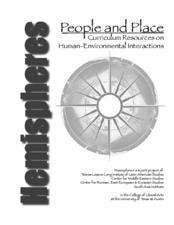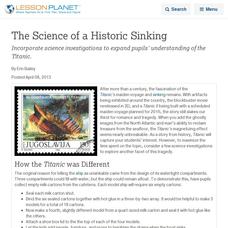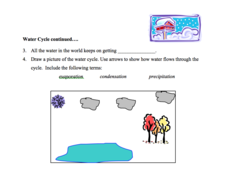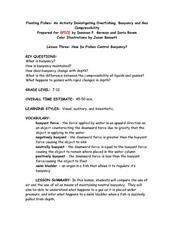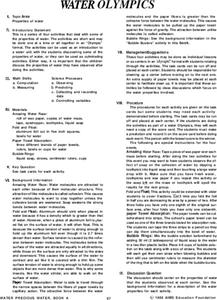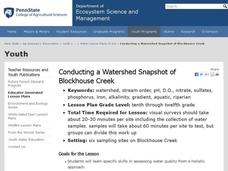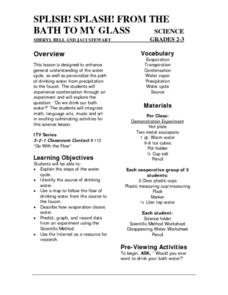Safe Drinking Water Foundation
Water Pollution
An introductory lesson to a unit on water pollution, young environmentalists are asked to brainstorm examples of pollutants in water. This lesson will help develop a sense of what water pollution is and where the pollutants come from.
Safe Drinking Water Foundation
Ask an Engineer
A wrap-up to the unit, young environmentalists discuss and write about the difference in perspectives of a water keeper and water treatment engineer.
Exploratorium
Descartes' Diver
Pique interest in water pressure, demonstrate buoyancy, and explore water displacement concepts with a homemade Cartesian diver. You may want to change the name of the toy, however, as is is not documented the Rene Descartes...
Berkshire Museum
Where’s the Water?: Acting Out Science Cycles
Young scientists transform themselves into rivers, oceans, clouds, and drops of water in order to explore the water cycle. After assigning and explaining to students their different roles in the activity, the teacher reads aloud a...
Foundation for Water & Energy Education
How is Flowing Water an Energy Source? Activity B
Explore the world's water without leaving the classroom! In this second of three uncomplicated but wonderful activities, physical science learners feel the pressure of water. They discover that the deeper the water, the stronger the...
Environmental Protection Agency (EPA)
How Much Water Do You Use?
Incorporate reading strategies, math, research, and the scientific method into one lesson about water conservation. After reading a story about a landlady trying to determine how many people are living in an apartment, learners develop a...
Environmental Protection Agency (EPA)
The Case of the Mysterious Renters
Upper-elementary kids examine the water usage in their own home, then use that data to solve a case in which a landlady is trying to determine how many people are living in an apartment being rented. Combine math, scientific method, and...
PricewaterhouseCoopers
Conservation: Water
Here is a fantastic experiment-based lesson plan on water conservation, waste, and filtration. The lesson plan is well-developed and provides background information, discussion leads, and six scripted lab activities anyone can do. The...
Institute of Electrical and Electronics Engineers
Filtration Investigation
Scholars build a simple filtration system to remove impurities from muddy water and rate the filtered water to a grade of clarity scale. The focus is on teamwork and problem solving. This instructional activity would be effective in your...
Baylor College
What Is a One Part Per Million Solution?
Water may appear to be crystal clear, but there could be dissolved substances present. Lab groups make a one-part-per-million of a food coloring solution to demonstrate this concept. As part of an outstanding unit about water, this...
Baylor College
What Makes Water Special?
Get close up and personal with a drop of water to discover how the polarity of its molecules affect its behavior. Elementary hydrologists split and combine water droplets, and also compare them to drops of oil. Much neater than placing a...
Baylor College
What Dissolves in Water?
One of water's claims to fame is as the universal solvent. Young physical scientists experiment to discover which materials dissolve in this special compound. You could never be more prepared for teaching this lesson than by using this...
Curated OER
Hemispheres: People and Place
Here is an astounding series of lessons, designed for high schoolers, on environmental policy. By studying water conservation in rural India, the role of the government, and the reaction of the people, learners begin to formulate...
Curated OER
What Is in the Water?
Students compare bottled water qualities to water found naturally in a pond habitat. They research their state's laws/regulations in regard to bottled water and study the advertising, cost, and quality of brands of bottled water. They...
Curated OER
The Science of a Historic Sinking
Incorporate science investigations to expand pupils' understanding of the Titanic.
Curated OER
Water, Water Everywhere!
Learners brainstorm on ways they use water, and where water comes from. They view video, Down the Drain, to gain specific facts about water use, properties of water, problems of water and the water cycle. They perform a lab activity...
Alabama Learning Exchange
Make a Difference!
We are very dependent upon other life forms around us to survive. Here, scholars explore relationships in the ecosystem with the help of Auntie Litter and the pollution patrol. They imagine a world without grass, making connections to...
Curated OER
Physical Properties of Matter
Five fabulous procedures introduce physics or chemistry classes to special properties of matter. They discover adhesion and cohesion, solubility, melting and boiling points, and viscosity through hands-on experiences. Tests are...
Curated OER
Floating Fishes: How do Fishes Control Buoyancy?
Playing with balloons, water, oil, and bottles help put this lesson over the top! Participants use air-filled balloons in water tanks to experience gas compression. They also use oil-filled bottles to experiment with buoyancy. Included...
Curated OER
Water Olympics
A fascinating and engaging lesson on the properties of water awaits you. In it, learners engage in four activities that are designed to teach about the properties of water. This exciting plan has worksheets embedded in it which make the...
Curated OER
Wild and Wetlands
Upper graders identify the major characteristics of a wetland. They explore the human factors that change a wetland and write a descriptive paragraph about wetlands. This comprehensive activity also has an interactive "Watershed Game"...
Curated OER
"Conducting a Watershed Snapshot of Blockhouse Creek"
Learners examine specific skills in assessing water quality from a holistic approach. They assess the health of a local watershed and identify problems in the local watershed and suggest remediation.
Curated OER
2001 U.S. National Chemistry Olympiad Part III
Here is a comprehensive method for assessing chemistry learners' knowledge; have them approach two laboratory problems, plan their methods of solving each, and then actually carry out the experiments to find the answers. Both the...
Curated OER
Splish! Splash! From the Bath to my Glass
An excellent lesson plan on the water cycle! In it, learners should gain a general understanding of the water cycle, along with how water first falls as precipitation, then ends up coming out of our faucets. This lesson plan nicely...














